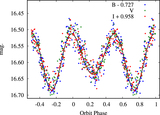1RXH J082623.6-505741: A New Long-period Cataclysmic Variable with an Evolved Donor and a Low Mass-transfer Rate
Abstract
We report the discovery of 1RXH J082623.6-505741, a 10.4 hr orbital period compact binary. Modeling extensive optical photometry and spectroscopy reveals a ~0.4 M ⊙ K-type secondary transferring mass through a low-state accretion disk to a nonmagnetic ~0.8 M ⊙ white dwarf. The secondary is overluminous for its mass and dominates the optical spectra at all epochs and must be evolved to fill its Roche Lobe at this orbital period. The X-ray luminosity L X ~ 1-2 × 1032 erg s-1 derived from both new XMM-Newton and archival observations, although high compared to most CVs, still only requires a modest accretion rate onto the white dwarf of $\dot{M}$ ~ 3 × 10-11 to 3 × 10-10 M ⊙ yr-1, lower than expected for a cataclysmic variable with an evolved secondary. No dwarf nova outbursts have yet been observed from the system, consistent with the low derived mass-transfer rate. Several other cataclysmic variables with similar orbital periods also show unexpectedly low mass-transfer rates, even though selection effects disfavor the discovery of binaries with these properties. This suggests the abundance and evolutionary state of long-period, low mass-transfer rate cataclysmic variables are worthy of additional attention.
- Publication:
-
The Astrophysical Journal
- Pub Date:
- August 2022
- DOI:
- arXiv:
- arXiv:2206.10625
- Bibcode:
- 2022ApJ...934..142S
- Keywords:
-
- Cataclysmic variable stars;
- X-ray binary stars;
- Spectroscopic binary stars;
- 203;
- 1811;
- 1557;
- Astrophysics - Solar and Stellar Astrophysics;
- Astrophysics - High Energy Astrophysical Phenomena
- E-Print:
- 21 pages, 8 figures, 1 table, accepted to ApJ
